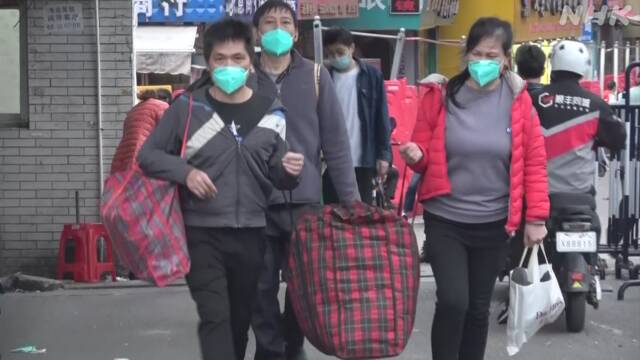While large-scale protests against the "zero corona" policy in China have developed into criticism of the system, some local governments are moving to significantly relax strict infection control measures, and the Chinese government is dissatisfied with the public. It is a form that has embarked on a response to prevent it from spreading further.
Large-scale protests against the "zero corona" policy have spread to various parts of the country, including the capital Beijing and Shanghai, as well as Guangdong Province and Guangzhou in the south, and in some places have developed into criticism of the Communist Party and President Xi Jinping.
In addition, there was growing dissatisfaction among the people, as some districts that were blocked due to infection control developed into clashes between residents and the police who demanded that the blockade be lifted.
Under these circumstances, in Guangzhou, where conflicts occurred intermittently, the scope of the blockade, which targeted the wide area around the confirmed infected person, was limited to the building where the infected person was confirmed. The local government announced the relaxation on the 30th.
In response to this, in areas where the blockade had lasted for more than a month, residents were seen going to buy food and migrant workers returning to their hometowns.
Some of them said, "I want to leave here as soon as possible" and "I couldn't eat freely and it was really painful."
The Chinese government has acknowledged that excessive infection control measures are being taken in some areas of the country, and has embarked on measures to prevent the dissatisfaction of the people from spreading further.
Protest against "zero corona" in Tokyo
On the night of the 30th, while large-scale protests against the "zero corona" policy occurred in various parts of China, Chinese people living in Japan and others also held protests in Shinjuku, Tokyo, criticizing the response of the authorities.
The protest was held around JR Shinjuku Station, and the participants raised their voices in Chinese and Japanese, saying, "Xi Jinping should resign. The Communist Party should resign."
Some of the participants also held up papers that said, "No blockade is needed. What we need is freedom," and white papers to protest against the "Zero Corona" policy.
Hundreds of people were believed to have gathered in the protest, which lasted about two hours, and some participants were hiding their faces with hats and masks so that their identities could not be identified.
A man in his 20s who called for protests said, ``I would like to continue these activities and widely appeal the problems of the ``zero corona'' policy.''
Protests are taking place around the world, including in the United States.
A protest against China's "zero corona" policy was held on the 29th in front of the Chinese Consulate General in New York, USA.
Approximately 400 people gathered at the protest, holding signs that read "Freedom for China" and "End the 'Zero Corona' policy" and chanting "Protect human rights".
A man who participated said, "I thought it was important to show my dissatisfaction with the current government, such as the Chinese government's corona policy and its response to those who protested against it. I don't think it's appropriate because of it," he said.
Protests were held in Toronto, Canada on the 29th, and have been held in other parts of the world, including Sydney, Australia and London, England.

